 1 citations,
April 2019 in “Clinical Breast Cancer”
1 citations,
April 2019 in “Clinical Breast Cancer” Medicines for enlarged prostate may raise the risk of breast growth and tenderness but not breast cancer.
 September 2011 in “Journal der Deutschen Dermatologischen Gesellschaft”
September 2011 in “Journal der Deutschen Dermatologischen Gesellschaft” Effective treatments for scalp psoriasis include glucocorticosteroids, Vitamin D3 analogs, and combination therapies like calcipotriol and betamethasone dipropionate.
 20 citations,
May 2018 in “The Journal of Urology”
20 citations,
May 2018 in “The Journal of Urology” Men taking 5-alpha-reductase inhibitors before or after bladder cancer diagnosis had a lower risk of dying from the disease.
 3 citations,
March 2018 in “European Urology Supplements”
3 citations,
March 2018 in “European Urology Supplements” Using 5-alpha-reductase inhibitors may improve bladder cancer survival in men.
 3 citations,
July 2014 in “Indian Journal of Surgery”
3 citations,
July 2014 in “Indian Journal of Surgery” Sex hormones might influence bladder cancer development, and aromatase inhibitors could increase risk in postmenopausal women.
 1 citations,
May 2023 in “Jurnal Kedokteran Diponegoro”
1 citations,
May 2023 in “Jurnal Kedokteran Diponegoro” Chemotherapy for prostate, bladder, and testicular cancer patients commonly causes hair loss, fatigue, and decreased appetite.
 7 citations,
May 2011 in “Hair transplant forum international”
7 citations,
May 2011 in “Hair transplant forum international” Pig bladder material can be used in hair restoration surgeries.
 November 2013 in “Journal of clinical & experimental dermatology research”
November 2013 in “Journal of clinical & experimental dermatology research” Using urinary bladder matrix and platelet rich plasma can effectively treat transplant scars and prevent hair loss.
 13 citations,
May 2018 in “Urologic Oncology: Seminars and Original Investigations”
13 citations,
May 2018 in “Urologic Oncology: Seminars and Original Investigations” Finasteride does not prevent bladder cancer.
13 citations,
September 2017 in “Life sciences” Androgens may influence bladder cancer progression by affecting cellular behavior.

A woman had eye pain and vision loss after a hair growth treatment, but her symptoms improved after a month.
 April 2013 in “The Journal of Urology”
April 2013 in “The Journal of Urology” Researchers created a simple tool to predict bladder blockage from prostate enlargement using urine flow rate and prostate volume.
 9 citations,
August 2019 in “Clinical genitourinary cancer”
9 citations,
August 2019 in “Clinical genitourinary cancer” Taking 5-Alpha Reductase Inhibitors before bladder removal surgery might make high-grade bladder tumors less aggressive.
 4 citations,
December 2019 in “Minerva Urology and Nephrology”
4 citations,
December 2019 in “Minerva Urology and Nephrology” 5-alpha reductase inhibitors may reduce bladder cancer recurrence and improve survival.
 17 citations,
February 2001 in “Urologia Internationalis”
17 citations,
February 2001 in “Urologia Internationalis” Stopping alpha-blocker medication after 6-9 months is safe and effective for most patients with bladder outlet obstruction.
3 citations,
June 2017 in “The Journal of urology/The journal of urology” Older men with postoperative urinary retention are more likely to need future bladder procedures.
 January 2019 in “Actas urológicas españolas”
January 2019 in “Actas urológicas españolas” Using mirabegron and solifenacin together is safe and more effective for treating overactive bladder than using either drug alone.
 30 citations,
July 2001 in “BJUI”
30 citations,
July 2001 in “BJUI” Combination therapy improves urinary flow and reduces residual urine, but needs better stent design.
 3 citations,
February 2019 in “Journal of endourology case reports”
3 citations,
February 2019 in “Journal of endourology case reports” Polypoid cystitis can mimic bladder cancer but can be effectively treated with surgery, stents, and medication.
 November 2024 in “Singapore Medical Journal”
November 2024 in “Singapore Medical Journal” A bladder rupture from prostate treatment was healed with catheterization and antibiotics.
 September 2011 in “Urology”
September 2011 in “Urology” Some patients fail bladder function tests due to lower flow rates and higher remaining urine volumes, but the exact reasons for failure are unclear.
 April 2007 in “Nature Clinical Practice Urology”
April 2007 in “Nature Clinical Practice Urology” Teaching men with simple bladder problems self-management skills can improve their symptoms and quality of life.
 30 citations,
August 2016 in “Advances in radiation oncology”
30 citations,
August 2016 in “Advances in radiation oncology” Researchers developed a mouse model that successfully mimics the bladder damage seen in humans after radiation therapy.
12 citations,
January 2018 in “Pharmacology & pharmacy” Pumpkin seed products may help improve prostate and bladder health by blocking certain enzymes and hormone receptors.
5 citations,
May 2018 in “European journal of pharmacology” Fesoterodine is effective and safe for elderly patients with overactive bladder.
 May 2023 in “International Journal of Molecular Sciences”
May 2023 in “International Journal of Molecular Sciences” Mesenchymal stem cells could help treat radiation-induced bladder damage but more research is needed to overcome current limitations.

Androgen suppression therapy (AST) doesn't significantly lower bladder cancer risk, but using finasteride, a type of AST, might reduce it. AST decreases recurrence-free survival but doesn't affect overall survival or progression-free survival. More research is needed to understand AST's benefits.

Androgen suppression therapy (AST) doesn't significantly lower bladder cancer risk, but using finasteride, a type of AST, might decrease the risk. AST also lessens the chance of cancer coming back but doesn't really affect survival rates. More research is needed to understand AST's benefits for different bladder cancers.
April 2017 in “The Journal of urology/The journal of urology” Finasteride use is linked to a lower risk of bladder cancer, especially in Caucasians and Hispanics.

Different botulinum toxin products and concentrations can effectively reduce sweating, itching, bladder pressure, hair loss, and muscle spasms.

























